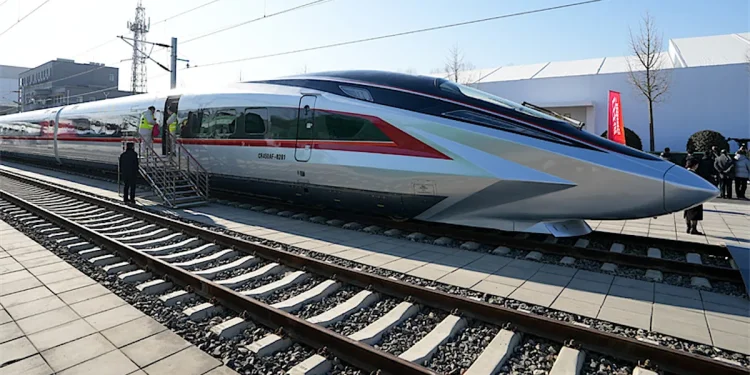By Mohamed Macarthy
My recent international trip to the People’s Republic of China (PRC) was an extraordinary and unforgettable experience. The visit was not just a study tour, but an intensive academic engagement enriched with visits to historic museums, industrial factories, and research institutions. These encounters offered the Sierra Leone delegation a deep and practical understanding of how the Communist Party of China (CPC) has strategically positioned the country as one of the fastest-growing and most industrialized nations on the global stage.
Our Governance Capacity Building delegation was sponsored by the Ministry of Commerce (MOFCOM) and organized by the University of Chinese Academy of Social Sciences (UCASS). Over the years, UCASS has earned a reputation as one of China’s most committed universities in Beijing and Guangzhou, conducting well-tailored research, intensive trainings, and policy-focused seminars for foreign participants, especially Africans. The focus is to expose partner countries to China’s governance architecture, educational system, development models, and cultural traits, with the hope that these lessons can aid stronger governance structures and sustainable development at home. Throughout the program, the delegation was deeply impressed by China’s transformational successes, particularly in the following areas:
𝗧𝗿𝗮𝗻𝘀𝗽𝗮𝗿𝗲𝗻𝗰𝘆 𝗮𝗻𝗱 𝗔𝗰𝗰𝗼𝘂𝗻𝘁𝗮𝗯𝗶𝗹𝗶𝘁𝘆 𝗶𝗻 𝗚𝗼𝘃𝗲𝗿𝗻𝗮𝗻𝗰𝗲:
The CPC has played a pivotal role in formulating and implementing large-scale strategic policies aimed at improving the livelihood of the Chinese people and driving poverty alleviation. The Party prides itself on discipline, integrity, and result-oriented leadership. These values are closely monitored across all levels, provinces, cities, and districts, to ensure that governance remains transparent and accountable. Nationalism and patriotism are not merely slogans; they are practiced values that guide citizens and leaders alike. As a result, China has recorded remarkable progress in lifting millions out of poverty, an achievement backed by sound economic policies and consistent political will.
𝗨𝗻𝗶𝗺𝗮𝗴𝗶𝗻𝗮𝗯𝗹𝗲 𝗜𝗻𝗳𝗿𝗮𝘀𝘁𝗿𝘂𝗰𝘁𝘂𝗿𝗮𝗹 𝗮𝗻𝗱 𝗧𝗲𝗰𝗵𝗻𝗼𝗹𝗼𝗴𝗶𝗰𝗮𝗹 𝗔𝗱𝘃𝗮𝗻𝗰𝗲𝗺𝗲𝗻𝘁𝘀:
China’s rapid infrastructural reforms and technological innovations continue to exceed global imagination and expectations. Contrary to some international misconceptions, the country’s development model is rooted in strategic planning, hard work, and a strong sense of national unity. The CPC has led a paradigm shift toward high-tech, sustainable, and future-oriented infrastructure. From artificial intelligence and digital transformation to ecological sustainability and advanced manufacturing, China has positioned itself as a global leader in innovation and industrialization. Our delegation was particularly amazed by the incredible and scale of these infrastructural advancements.
𝗘𝗳𝗳𝗲𝗰𝘁𝗶𝘃𝗲 𝗦𝘁𝗿𝗮𝘁𝗲𝗴𝗶𝗲𝘀 𝘁𝗼 𝗖𝘂𝗿𝗯 𝗖𝗼𝗿𝗿𝘂𝗽𝘁𝗶𝗼𝗻:
Corruption remains one of the most troubling situations facing many developing nations. During our three-week engagement in Beijing and Guangzhou, we witnessed first-hand what a governance environment with minimal corruption can achieve. In China, anti-corruption enforcement is firm and uncompromising. Since 2012, President Xi Jinping’s sweeping anti-corruption campaign has been consistent and far-reaching, targeting officials in central and local governments, state-owned enterprises, and even the People’s Liberation Army. This sustained effort has yielded significant dividends for the Chinese people and contributed to a more disciplined, stable, and trusted governance system.
𝗧𝗵𝗲 𝗖𝗵𝗶𝗻𝗲𝘀𝗲 𝗧𝗿𝗮𝗱𝗲 𝗮𝗻𝗱 𝗣𝗿𝗼𝗱𝘂𝗰𝘁𝗶𝗼𝗻 𝗘𝘃𝗼𝗹𝘂𝘁𝗶𝗼𝗻:
China’s trade policies are a constant subject of global debate, but one thing is clear: the country has become a hub in global manufacturing and logistics. Its ports are among the busiest in the world, efficiently handling massive volumes of international cargo. China has expanded its industrial capabilities, moving from low-cost manufacturing to high-value production and global export leadership.
A major milestone was the launch of the Belt and Road Initiative (BRI) in 2013. Known as the “New Silk Road,” the BRI seeks to strengthen global infrastructure, enhance connectivity, and expand economic cooperation. While the initiative has faced challenges, such as debt concerns, governance complexities, and environmental issues, it remains a cornerstone of China’s international economic strategy and a testament to its ambition to reshape global trade.
𝗖𝗵𝗶𝗻𝗮’𝘀 𝗥𝗶𝘀𝗲 𝗶𝗻 𝗚𝗹𝗼𝗯𝗮𝗹 𝗘𝗱𝘂𝗰𝗮𝘁𝗶𝗼𝗻:
Education is a pillar of national development, and China has made it one of its flagship priorities. The government has invested heavily in universities, research institutions, and educational infrastructure, dramatically elevating the global standing of Chinese education. Higher education enrollment has grown by more than 60%, and many Chinese universities have risen significantly in global rankings through enhanced research output, international collaboration, and institutional reforms.
Our delegation witnessed many of these achievements firsthand. The increasing number of international students, especially from Africa, who pursue high-quality education in China and return home with new skills and perspectives is further evidence of China’s expanding influence in global education.
Finally, the progress China has recorded in its governance architecture, development, models and cultural traits did not happen overnight. It is a product of visionary leadership, strategic planning, disciplined governance and a deep commitment national development over partisan and individual interest. The lessons learned from this Governance Capacity Building to the People’s Republic of China provide valuable insights for countries like ours (Sierra Leone), particularly in governance, education, infrastructure and anti-corruption drives. As China continues to rise, its development endeavour serves as both a model and an inspirations for developing nations seeking sustainable progress.













